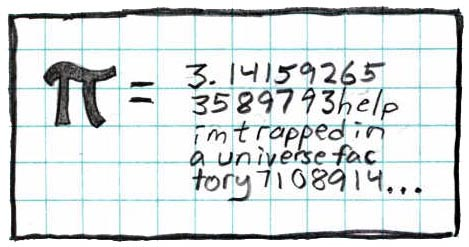Including relevant XKCD as demanded by internet law: https://xkcd.com/10/

Post funny things about programming here! (Or just rant about your favourite programming language.)
Including relevant XKCD as demanded by internet law: https://xkcd.com/10/

Oooh, a rare two-digit.
Eating the onion is sure popular today!
they didn't?
This just in: Measurements are now limited to ~3M decimals.
Science is ruined!
Microsoft sues the Library of Babel
“I may be a staunch atheist,” said Richard Stallman, creator of the GNU + Linux operating system and self-proclaimed architect of the modern world, “but any decent analysis in comparative religion would conclude that the universe is a copyleft creation, thereby pi should automatically fall under the terms of the GNUv3 license.”
Lol, he would actually say that
Is there an algorithm or number such that we could basically pirate data from it by saying "start digit 9,031,643,679 with length 5,345,109 is an MP4 of Shrek"? Something that we could calculate in a day or less?
Similarly: if you write a program to randomly run through all the combinations of pixels on a decently large screen (say, 1080p) you will eventually see every important question and answer that can be expressed on a screen.
Could we already do this by leveraging the Library of Babel?
Genuinely asking, I'm not really sure.
you can bookmark(?) pages
The short answer is no, and even if we could, the digit index you'd start at would have a larger binary representation than the actual data you were trying to encode.
There's no way the copyright office is actually going to approve this right?
I think this is satire. Poe's law is stronger than ever
If pi is truly infinite, then it contains all the works of Shakespeare, every version of Windows, and this comment I'm typing right now.
That's not how it's works. Being "infinite" is not enough, the number 1.110100100010000... is "infinite", without repeating patterns and dosen't have other digits that 1 or 0.
Yes that's why they specified pi.
Still not enough, or at least pi is not known to have this property. You need the number to be "normal" (or a slightly weaker property) which turns out to be hard to prove about most numbers.
Wikipedia for normal numbers, and for disjunctive sequences, which is the slightly weaker property mentioned.
"Nearly all real numbers are normal (basically no real numbers are not normal), but we're only aware of a few. This one literally non-computable one for sure. Maybe sqrt(2)."
Gotta love it.
We're so used to dealing with real numbers it's easy to forget they're terrible. These puppies are a particularly egregious example I like to point to - functions that preserve addition but literally black out the entire x-y plane when plotted. On rational numbers all additive functions are automatically linear, of the form mx+n. There's no nice in-between on the reals, either; it's the "curve" from hell or a line.
Hot take, but I really hope physics will turn out to work without them.
to be fair, though, 1 and 0 are just binary representations of values, same as decimal and hexadecimal. within your example, we'd absolutely find the entire works of shakespeare encoded in ascii, unicode, and lcd pixel format with each letter arranged in 3x5 grids.
Doesn't, the binary pattern 10101010 dosen't exists on that number, for example.
You can encode base 2 as base 10, I don't think anyone is saying it exists in binary form.
If it's infinite without repeating patterns then it just contain all patterns, no? Eh i guess that's not how that works, is it? Half of all patterns is still infinity.
No. 1011001110001111... (One 1, one 0, two 1s, two zeros....) Doesn't contain repeating patterns. It also doesn't contain any patterns with '2' in it.
But pi is believed to be normal. https://en.m.wikipedia.org/wiki/Normal_number
So it should contain all finite patterns an infinite number of times.
However, as the name implies, this is nothing special about pi. Almost all numbers have this property. If anything, it's the integers that we should be finding weird, like you mean to tell me that every single digit after the decimal point is a zero? No matter how far you go, just zeroes forever?
shaves the sphere down with a sculptor's knife
There. 3.1416. Not perfectly round but it'll bake in the oven just fine.